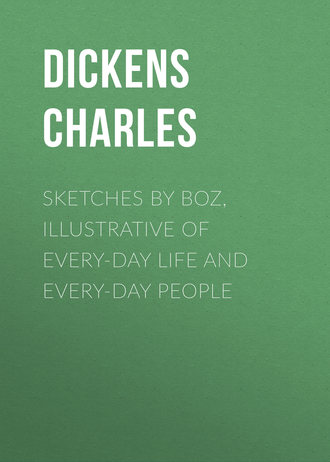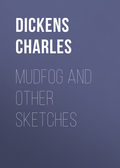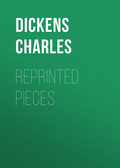
Чарльз Диккенс
Sketches by Boz, Illustrative of Every-Day Life and Every-Day People
CHAPTER V – THE PARLOUR ORATOR
We had been lounging one evening, down Oxford-street, Holborn, Cheapside, Coleman-street, Finsbury-square, and so on, with the intention of returning westward, by Pentonville and the New-road, when we began to feel rather thirsty, and disposed to rest for five or ten minutes. So, we turned back towards an old, quiet, decent public-house, which we remembered to have passed but a moment before (it was not far from the City-road), for the purpose of solacing ourself with a glass of ale. The house was none of your stuccoed, French-polished, illuminated palaces, but a modest public-house of the old school, with a little old bar, and a little old landlord, who, with a wife and daughter of the same pattern, was comfortably seated in the bar aforesaid – a snug little room with a cheerful fire, protected by a large screen: from behind which the young lady emerged on our representing our inclination for a glass of ale.
‘Won’t you walk into the parlour, sir?’ said the young lady, in seductive tones.
‘You had better walk into the parlour, sir,’ said the little old landlord, throwing his chair back, and looking round one side of the screen, to survey our appearance.
‘You had much better step into the parlour, sir,’ said the little old lady, popping out her head, on the other side of the screen.
We cast a slight glance around, as if to express our ignorance of the locality so much recommended. The little old landlord observed it; bustled out of the small door of the small bar; and forthwith ushered us into the parlour itself.
It was an ancient, dark-looking room, with oaken wainscoting, a sanded floor, and a high mantel-piece. The walls were ornamented with three or four old coloured prints in black frames, each print representing a naval engagement, with a couple of men-of-war banging away at each other most vigorously, while another vessel or two were blowing up in the distance, and the foreground presented a miscellaneous collection of broken masts and blue legs sticking up out of the water. Depending from the ceiling in the centre of the room, were a gas-light and bell-pull; on each side were three or four long narrow tables, behind which was a thickly-planted row of those slippery, shiny-looking wooden chairs, peculiar to hostelries of this description. The monotonous appearance of the sanded boards was relieved by an occasional spittoon; and a triangular pile of those useful articles adorned the two upper corners of the apartment.
At the furthest table, nearest the fire, with his face towards the door at the bottom of the room, sat a stoutish man of about forty, whose short, stiff, black hair curled closely round a broad high forehead, and a face to which something besides water and exercise had communicated a rather inflamed appearance. He was smoking a cigar, with his eyes fixed on the ceiling, and had that confident oracular air which marked him as the leading politician, general authority, and universal anecdote-relater, of the place. He had evidently just delivered himself of something very weighty; for the remainder of the company were puffing at their respective pipes and cigars in a kind of solemn abstraction, as if quite overwhelmed with the magnitude of the subject recently under discussion.
On his right hand sat an elderly gentleman with a white head, and broad-brimmed brown hat; on his left, a sharp-nosed, light-haired man in a brown surtout reaching nearly to his heels, who took a whiff at his pipe, and an admiring glance at the red-faced man, alternately.
‘Very extraordinary!’ said the light-haired man after a pause of five minutes. A murmur of assent ran through the company.
‘Not at all extraordinary – not at all,’ said the red-faced man, awakening suddenly from his reverie, and turning upon the light-haired man, the moment he had spoken.
‘Why should it be extraordinary? – why is it extraordinary? – prove it to be extraordinary!’
‘Oh, if you come to that – ’ said the light-haired man, meekly.
‘Come to that!’ ejaculated the man with the red face; ‘but we must come to that. We stand, in these times, upon a calm elevation of intellectual attainment, and not in the dark recess of mental deprivation. Proof, is what I require – proof, and not assertions, in these stirring times. Every gen’lem’n that knows me, knows what was the nature and effect of my observations, when it was in the contemplation of the Old-street Suburban Representative Discovery Society, to recommend a candidate for that place in Cornwall there – I forget the name of it. “Mr. Snobee,” said Mr. Wilson, “is a fit and proper person to represent the borough in Parliament.” “Prove it,” says I. “He is a friend to Reform,” says Mr. Wilson. “Prove it,” says I. “The abolitionist of the national debt, the unflinching opponent of pensions, the uncompromising advocate of the negro, the reducer of sinecures and the duration of Parliaments; the extender of nothing but the suffrages of the people,” says Mr. Wilson. “Prove it,” says I. “His acts prove it,” says he. “Prove them,” says I.
‘And he could not prove them,’ said the red-faced man, looking round triumphantly; ‘and the borough didn’t have him; and if you carried this principle to the full extent, you’d have no debt, no pensions, no sinecures, no negroes, no nothing. And then, standing upon an elevation of intellectual attainment, and having reached the summit of popular prosperity, you might bid defiance to the nations of the earth, and erect yourselves in the proud confidence of wisdom and superiority. This is my argument – this always has been my argument – and if I was a Member of the House of Commons to-morrow, I’d make ’em shake in their shoes with it. And the red-faced man, having struck the table very hard with his clenched fist, to add weight to the declaration, smoked away like a brewery.
‘Well!’ said the sharp-nosed man, in a very slow and soft voice, addressing the company in general, ‘I always do say, that of all the gentlemen I have the pleasure of meeting in this room, there is not one whose conversation I like to hear so much as Mr. Rogers’s, or who is such improving company.’
‘Improving company!’ said Mr. Rogers, for that, it seemed, was the name of the red-faced man. ‘You may say I am improving company, for I’ve improved you all to some purpose; though as to my conversation being as my friend Mr. Ellis here describes it, that is not for me to say anything about. You, gentlemen, are the best judges on that point; but this I will say, when I came into this parish, and first used this room, ten years ago, I don’t believe there was one man in it, who knew he was a slave – and now you all know it, and writhe under it. Inscribe that upon my tomb, and I am satisfied.’
‘Why, as to inscribing it on your tomb,’ said a little greengrocer with a chubby face, ‘of course you can have anything chalked up, as you likes to pay for, so far as it relates to yourself and your affairs; but, when you come to talk about slaves, and that there abuse, you’d better keep it in the family, ’cos I for one don’t like to be called them names, night after night.’
‘You are a slave,’ said the red-faced man, ‘and the most pitiable of all slaves.’
‘Werry hard if I am,’ interrupted the greengrocer, ‘for I got no good out of the twenty million that was paid for ’mancipation, anyhow.’
‘A willing slave,’ ejaculated the red-faced man, getting more red with eloquence, and contradiction – ‘resigning the dearest birthright of your children – neglecting the sacred call of Liberty – who, standing imploringly before you, appeals to the warmest feelings of your heart, and points to your helpless infants, but in vain.’
‘Prove it,’ said the greengrocer.
‘Prove it!’ sneered the man with the red face. ‘What! bending beneath the yoke of an insolent and factious oligarchy; bowed down by the domination of cruel laws; groaning beneath tyranny and oppression on every hand, at every side, and in every corner. Prove it! – ’ The red-faced man abruptly broke off, sneered melo-dramatically, and buried his countenance and his indignation together, in a quart pot.
‘Ah, to be sure, Mr. Rogers,’ said a stout broker in a large waistcoat, who had kept his eyes fixed on this luminary all the time he was speaking. ‘Ah, to be sure,’ said the broker with a sigh, ‘that’s the point.’
‘Of course, of course,’ said divers members of the company, who understood almost as much about the matter as the broker himself.
‘You had better let him alone, Tommy,’ said the broker, by way of advice to the little greengrocer; ‘he can tell what’s o’clock by an eight-day, without looking at the minute hand, he can. Try it on, on some other suit; it won’t do with him, Tommy.’
‘What is a man?’ continued the red-faced specimen of the species, jerking his hat indignantly from its peg on the wall. ‘What is an Englishman? Is he to be trampled upon by every oppressor? Is he to be knocked down at everybody’s bidding? What’s freedom? Not a standing army. What’s a standing army? Not freedom. What’s general happiness? Not universal misery. Liberty ain’t the window-tax, is it? The Lords ain’t the Commons, are they?’ And the red-faced man, gradually bursting into a radiating sentence, in which such adjectives as ‘dastardly,’ ‘oppressive,’ ‘violent,’ and ‘sanguinary,’ formed the most conspicuous words, knocked his hat indignantly over his eyes, left the room, and slammed the door after him.
‘Wonderful man!’ said he of the sharp nose.
‘Splendid speaker!’ added the broker.
‘Great power!’ said everybody but the greengrocer. And as they said it, the whole party shook their heads mysteriously, and one by one retired, leaving us alone in the old parlour.
If we had followed the established precedent in all such instances, we should have fallen into a fit of musing, without delay. The ancient appearance of the room – the old panelling of the wall – the chimney blackened with smoke and age – would have carried us back a hundred years at least, and we should have gone dreaming on, until the pewter-pot on the table, or the little beer-chiller on the fire, had started into life, and addressed to us a long story of days gone by. But, by some means or other, we were not in a romantic humour; and although we tried very hard to invest the furniture with vitality, it remained perfectly unmoved, obstinate, and sullen. Being thus reduced to the unpleasant necessity of musing about ordinary matters, our thoughts reverted to the red-faced man, and his oratorical display.
A numerous race are these red-faced men; there is not a parlour, or club-room, or benefit society, or humble party of any kind, without its red-faced man. Weak-pated dolts they are, and a great deal of mischief they do to their cause, however good. So, just to hold a pattern one up, to know the others by, we took his likeness at once, and put him in here. And that is the reason why we have written this paper.
CHAPTER VI – THE HOSPITAL PATIENT
In our rambles through the streets of London after evening has set in, we often pause beneath the windows of some public hospital, and picture to ourself the gloomy and mournful scenes that are passing within. The sudden moving of a taper as its feeble ray shoots from window to window, until its light gradually disappears, as if it were carried farther back into the room to the bedside of some suffering patient, is enough to awaken a whole crowd of reflections; the mere glimmering of the low-burning lamps, which, when all other habitations are wrapped in darkness and slumber, denote the chamber where so many forms are writhing with pain, or wasting with disease, is sufficient to check the most boisterous merriment.
Who can tell the anguish of those weary hours, when the only sound the sick man hears, is the disjointed wanderings of some feverish slumberer near him, the low moan of pain, or perhaps the muttered, long-forgotten prayer of a dying man? Who, but they who have felt it, can imagine the sense of loneliness and desolation which must be the portion of those who in the hour of dangerous illness are left to be tended by strangers; for what hands, be they ever so gentle, can wipe the clammy brow, or smooth the restless bed, like those of mother, wife, or child?
Impressed with these thoughts, we have turned away, through the nearly-deserted streets; and the sight of the few miserable creatures still hovering about them, has not tended to lessen the pain which such meditations awaken. The hospital is a refuge and resting-place for hundreds, who but for such institutions must die in the streets and doorways; but what can be the feelings of some outcasts when they are stretched on the bed of sickness with scarcely a hope of recovery? The wretched woman who lingers about the pavement, hours after midnight, and the miserable shadow of a man – the ghastly remnant that want and drunkenness have left – which crouches beneath a window-ledge, to sleep where there is some shelter from the rain, have little to bind them to life, but what have they to look back upon, in death? What are the unwonted comforts of a roof and a bed, to them, when the recollections of a whole life of debasement stalk before them; when repentance seems a mockery, and sorrow comes too late?
About a twelvemonth ago, as we were strolling through Covent-garden (we had been thinking about these things over-night), we were attracted by the very prepossessing appearance of a pickpocket, who having declined to take the trouble of walking to the Police-office, on the ground that he hadn’t the slightest wish to go there at all, was being conveyed thither in a wheelbarrow, to the huge delight of a crowd.
Somehow, we never can resist joining a crowd, so we turned back with the mob, and entered the office, in company with our friend the pickpocket, a couple of policemen, and as many dirty-faced spectators as could squeeze their way in.
There was a powerful, ill-looking young fellow at the bar, who was undergoing an examination, on the very common charge of having, on the previous night, ill-treated a woman, with whom he lived in some court hard by. Several witnesses bore testimony to acts of the grossest brutality; and a certificate was read from the house-surgeon of a neighbouring hospital, describing the nature of the injuries the woman had received, and intimating that her recovery was extremely doubtful.
Some question appeared to have been raised about the identity of the prisoner; for when it was agreed that the two magistrates should visit the hospital at eight o’clock that evening, to take her deposition, it was settled that the man should be taken there also. He turned pale at this, and we saw him clench the bar very hard when the order was given. He was removed directly afterwards, and he spoke not a word.
We felt an irrepressible curiosity to witness this interview, although it is hard to tell why, at this instant, for we knew it must be a painful one. It was no very difficult matter for us to gain permission, and we obtained it.
The prisoner, and the officer who had him in custody, were already at the hospital when we reached it, and waiting the arrival of the magistrates in a small room below stairs. The man was handcuffed, and his hat was pulled forward over his eyes. It was easy to see, though, by the whiteness of his countenance, and the constant twitching of the muscles of his face, that he dreaded what was to come. After a short interval, the magistrates and clerk were bowed in by the house-surgeon and a couple of young men who smelt very strong of tobacco-smoke – they were introduced as ‘dressers’ – and after one magistrate had complained bitterly of the cold, and the other of the absence of any news in the evening paper, it was announced that the patient was prepared; and we were conducted to the ‘casualty ward’ in which she was lying.
The dim light which burnt in the spacious room, increased rather than diminished the ghastly appearance of the hapless creatures in the beds, which were ranged in two long rows on either side. In one bed, lay a child enveloped in bandages, with its body half-consumed by fire; in another, a female, rendered hideous by some dreadful accident, was wildly beating her clenched fists on the coverlet, in pain; on a third, there lay stretched a young girl, apparently in the heavy stupor often the immediate precursor of death: her face was stained with blood, and her breast and arms were bound up in folds of linen. Two or three of the beds were empty, and their recent occupants were sitting beside them, but with faces so wan, and eyes so bright and glassy, that it was fearful to meet their gaze. On every face was stamped the expression of anguish and suffering.
The object of the visit was lying at the upper end of the room. She was a fine young woman of about two or three and twenty. Her long black hair, which had been hastily cut from near the wounds on her head, streamed over the pillow in jagged and matted locks. Her face bore deep marks of the ill-usage she had received: her hand was pressed upon her side, as if her chief pain were there; her breathing was short and heavy; and it was plain to see that she was dying fast. She murmured a few words in reply to the magistrate’s inquiry whether she was in great pain; and, having been raised on the pillow by the nurse, looked vacantly upon the strange countenances that surrounded her bed. The magistrate nodded to the officer, to bring the man forward. He did so, and stationed him at the bedside. The girl looked on with a wild and troubled expression of face; but her sight was dim, and she did not know him.
‘Take off his hat,’ said the magistrate. The officer did as he was desired, and the man’s features were disclosed.
The girl started up, with an energy quite preternatural; the fire gleamed in her heavy eyes, and the blood rushed to her pale and sunken cheeks. It was a convulsive effort. She fell back upon her pillow, and covering her scarred and bruised face with her hands, burst into tears. The man cast an anxious look towards her, but otherwise appeared wholly unmoved. After a brief pause the nature of the errand was explained, and the oath tendered.
‘Oh, no, gentlemen,’ said the girl, raising herself once more, and folding her hands together; ‘no, gentlemen, for God’s sake! I did it myself – it was nobody’s fault – it was an accident. He didn’t hurt me; he wouldn’t for all the world. Jack, dear Jack, you know you wouldn’t!’
Her sight was fast failing her, and her hand groped over the bedclothes in search of his. Brute as the man was, he was not prepared for this. He turned his face from the bed, and sobbed. The girl’s colour changed, and her breathing grew more difficult. She was evidently dying.
‘We respect the feelings which prompt you to this,’ said the gentleman who had spoken first, ‘but let me warn you, not to persist in what you know to be untrue, until it is too late. It cannot save him.’
‘Jack,’ murmured the girl, laying her hand upon his arm, ‘they shall not persuade me to swear your life away. He didn’t do it, gentlemen. He never hurt me.’ She grasped his arm tightly, and added, in a broken whisper, ‘I hope God Almighty will forgive me all the wrong I have done, and the life I have led. God bless you, Jack. Some kind gentleman take my love to my poor old father. Five years ago, he said he wished I had died a child. Oh, I wish I had! I wish I had!’
The nurse bent over the girl for a few seconds, and then drew the sheet over her face. It covered a corpse.
CHAPTER VII – THE MISPLACED ATTACHMENT OF MR. JOHN DOUNCE
If we had to make a classification of society, there is a particular kind of men whom we should immediately set down under the head of ‘Old Boys;’ and a column of most extensive dimensions the old boys would require. To what precise causes the rapid advance of old-boy population is to be traced, we are unable to determine. It would be an interesting and curious speculation, but, as we have not sufficient space to devote to it here, we simply state the fact that the numbers of the old boys have been gradually augmenting within the last few years, and that they are at this moment alarmingly on the increase.
Upon a general review of the subject, and without considering it minutely in detail, we should be disposed to subdivide the old boys into two distinct classes – the gay old boys, and the steady old boys. The gay old boys, are paunchy old men in the disguise of young ones, who frequent the Quadrant and Regent-street in the day-time: the theatres (especially theatres under lady management) at night; and who assume all the foppishness and levity of boys, without the excuse of youth or inexperience. The steady old boys are certain stout old gentlemen of clean appearance, who are always to be seen in the same taverns, at the same hours every evening, smoking and drinking in the same company.
There was once a fine collection of old boys to be seen round the circular table at Offley’s every night, between the hours of half-past eight and half-past eleven. We have lost sight of them for some time. There were, and may be still, for aught we know, two splendid specimens in full blossom at the Rainbow Tavern in Fleet-street, who always used to sit in the box nearest the fireplace, and smoked long cherry-stick pipes which went under the table, with the bowls resting on the floor. Grand old boys they were – fat, red-faced, white-headed old fellows – always there – one on one side the table, and the other opposite – puffing and drinking away in great state. Everybody knew them, and it was supposed by some people that they were both immortal.
Mr. John Dounce was an old boy of the latter class (we don’t mean immortal, but steady), a retired glove and braces maker, a widower, resident with three daughters – all grown up, and all unmarried – in Cursitor-street, Chancery-lane. He was a short, round, large-faced, tubbish sort of man, with a broad-brimmed hat, and a square coat; and had that grave, but confident, kind of roll, peculiar to old boys in general. Regular as clockwork – breakfast at nine – dress and tittivate a little – down to the Sir Somebody’s Head – a glass of ale and the paper – come back again, and take daughters out for a walk – dinner at three – glass of grog and pipe – nap – tea – little walk – Sir Somebody’s Head again – capital house – delightful evenings. There were Mr. Harris, the law-stationer, and Mr. Jennings, the robe-maker (two jolly young fellows like himself), and Jones, the barrister’s clerk – rum fellow that Jones – capital company – full of anecdote! – and there they sat every night till just ten minutes before twelve, drinking their brandy-and-water, and smoking their pipes, and telling stories, and enjoying themselves with a kind of solemn joviality particularly edifying.
Sometimes Jones would propose a half-price visit to Drury Lane or Covent Garden, to see two acts of a five-act play, and a new farce, perhaps, or a ballet, on which occasions the whole four of them went together: none of your hurrying and nonsense, but having their brandy-and-water first, comfortably, and ordering a steak and some oysters for their supper against they came back, and then walking coolly into the pit, when the ‘rush’ had gone in, as all sensible people do, and did when Mr. Dounce was a young man, except when the celebrated Master Betty was at the height of his popularity, and then, sir, – then – Mr. Dounce perfectly well remembered getting a holiday from business; and going to the pit doors at eleven o’clock in the forenoon, and waiting there, till six in the afternoon, with some sandwiches in a pocket-handkerchief and some wine in a phial; and fainting after all, with the heat and fatigue, before the play began; in which situation he was lifted out of the pit, into one of the dress boxes, sir, by five of the finest women of that day, sir, who compassionated his situation and administered restoratives, and sent a black servant, six foot high, in blue and silver livery, next morning with their compliments, and to know how he found himself, sir – by G-! Between the acts Mr. Dounce and Mr. Harris, and Mr. Jennings, used to stand up, and look round the house, and Jones – knowing fellow that Jones – knew everybody – pointed out the fashionable and celebrated Lady So-and-So in the boxes, at the mention of whose name Mr. Dounce, after brushing up his hair, and adjusting his neckerchief, would inspect the aforesaid Lady So-and-So through an immense glass, and remark, either, that she was a ‘fine woman – very fine woman, indeed,’ or that ‘there might be a little more of her, eh, Jones?’ Just as the case might happen to be. When the dancing began, John Dounce and the other old boys were particularly anxious to see what was going forward on the stage, and Jones – wicked dog that Jones – whispered little critical remarks into the ears of John Dounce, which John Dounce retailed to Mr. Harris and Mr. Harris to Mr. Jennings; and then they all four laughed, until the tears ran down out of their eyes.
When the curtain fell, they walked back together, two and two, to the steaks and oysters; and when they came to the second glass of brandy-and-water, Jones – hoaxing scamp, that Jones – used to recount how he had observed a lady in white feathers, in one of the pit boxes, gazing intently on Mr. Dounce all the evening, and how he had caught Mr. Dounce, whenever he thought no one was looking at him, bestowing ardent looks of intense devotion on the lady in return; on which Mr. Harris and Mr. Jennings used to laugh very heartily, and John Dounce more heartily than either of them, acknowledging, however, that the time had been when he might have done such things; upon which Mr. Jones used to poke him in the ribs, and tell him he had been a sad dog in his time, which John Dounce with chuckles confessed. And after Mr. Harris and Mr. Jennings had preferred their claims to the character of having been sad dogs too, they separated harmoniously, and trotted home.
The decrees of Fate, and the means by which they are brought about, are mysterious and inscrutable. John Dounce had led this life for twenty years and upwards, without wish for change, or care for variety, when his whole social system was suddenly upset and turned completely topsy-turvy – not by an earthquake, or some other dreadful convulsion of nature, as the reader would be inclined to suppose, but by the simple agency of an oyster; and thus it happened.
Mr. John Dounce was returning one night from the Sir Somebody’s Head, to his residence in Cursitor-street – not tipsy, but rather excited, for it was Mr. Jennings’s birthday, and they had had a brace of partridges for supper, and a brace of extra glasses afterwards, and Jones had been more than ordinarily amusing – when his eyes rested on a newly-opened oyster-shop, on a magnificent scale, with natives laid, one deep, in circular marble basins in the windows, together with little round barrels of oysters directed to Lords and Baronets, and Colonels and Captains, in every part of the habitable globe.
Behind the natives were the barrels, and behind the barrels was a young lady of about five-and-twenty, all in blue, and all alone – splendid creature, charming face and lovely figure! It is difficult to say whether Mr. John Dounce’s red countenance, illuminated as it was by the flickering gas-light in the window before which he paused, excited the lady’s risibility, or whether a natural exuberance of animal spirits proved too much for that staidness of demeanour which the forms of society rather dictatorially prescribe. But certain it is, that the lady smiled; then put her finger upon her lip, with a striking recollection of what was due to herself; and finally retired, in oyster-like bashfulness, to the very back of the counter. The sad-dog sort of feeling came strongly upon John Dounce: he lingered – the lady in blue made no sign. He coughed – still she came not. He entered the shop.
‘Can you open me an oyster, my dear?’ said Mr. John Dounce.
‘Dare say I can, sir,’ replied the lady in blue, with playfulness. And Mr. John Dounce eat one oyster, and then looked at the young lady, and then eat another, and then squeezed the young lady’s hand as she was opening the third, and so forth, until he had devoured a dozen of those at eightpence in less than no time.
‘Can you open me half-a-dozen more, my dear?’ inquired Mr. John Dounce.
‘I’ll see what I can do for you, sir,’ replied the young lady in blue, even more bewitchingly than before; and Mr. John Dounce eat half-a-dozen more of those at eightpence.
‘You couldn’t manage to get me a glass of brandy-and-water, my dear, I suppose?’ said Mr. John Dounce, when he had finished the oysters: in a tone which clearly implied his supposition that she could.
‘I’ll see, sir,’ said the young lady: and away she ran out of the shop, and down the street, her long auburn ringlets shaking in the wind in the most enchanting manner; and back she came again, tripping over the coal-cellar lids like a whipping-top, with a tumbler of brandy-and-water, which Mr. John Dounce insisted on her taking a share of, as it was regular ladies’ grog – hot, strong, sweet, and plenty of it.
So, the young lady sat down with Mr. John Dounce, in a little red box with a green curtain, and took a small sip of the brandy-and-water, and a small look at Mr. John Dounce, and then turned her head away, and went through various other serio-pantomimic fascinations, which forcibly reminded Mr. John Dounce of the first time he courted his first wife, and which made him feel more affectionate than ever; in pursuance of which affection, and actuated by which feeling, Mr. John Dounce sounded the young lady on her matrimonial engagements, when the young lady denied having formed any such engagements at all – she couldn’t abear the men, they were such deceivers; thereupon Mr. John Dounce inquired whether this sweeping condemnation was meant to include other than very young men; on which the young lady blushed deeply – at least she turned away her head, and said Mr. John Dounce had made her blush, so of course she did blush – and Mr. John Dounce was a long time drinking the brandy-and-water; and, at last, John Dounce went home to bed, and dreamed of his first wife, and his second wife, and the young lady, and partridges, and oysters, and brandy-and-water, and disinterested attachments.







